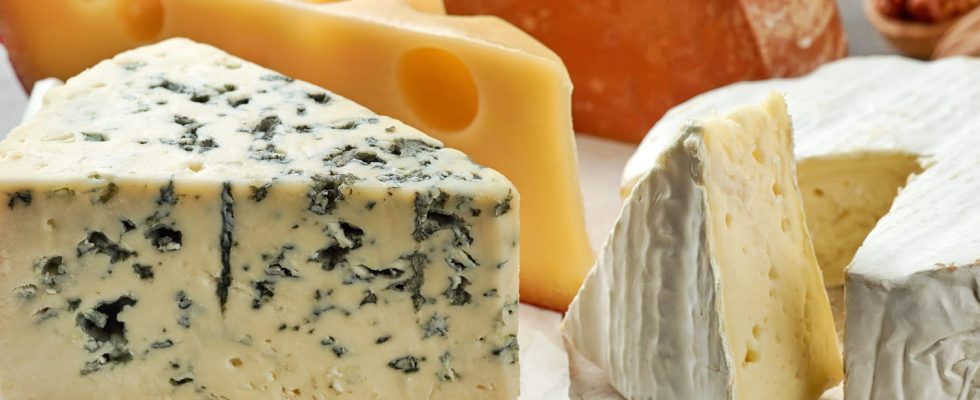A pregnant woman can eat cheese, but not just any cheese. Cheeses made from raw milk, pasteurized milk. Here is a list of cheeses authorized and those prohibited during pregnancy, with the advice of Caroline Séguy, dietician-nutritionist.
Cheeses are among the foods to watch out for during pregnancy because of the risks of listeriosis and toxoplasmosis for pregnant women, certain cheeses should be avoided, in particular raw milk cheeses and cut cheeses. However, it is not always easy to find your way among all the cheese references. Which cheeses are prohibited and which are allowed during pregnancy? Elements of answers with Caroline Séguy, dietician-nutritionist in Saint-Leu-d’Esserent.
What cheeses are allowed when pregnant?
“All pasteurized milk cheesesWhatever the milk (cow, goat, sheep), the fresh or aged cheeses (without the crusts), the processed cheeses (gruyere cream, cancoillotte, etc.) and raw milk cheeses, but cooked pressed paste (hard cheeses such as Comté, Parmesan, etc.) are authorized during pregnancy”, says the dietitian.
Pasteurized milk cheeses
During pregnancy, always check that the cheese has undergone a pasteurization process. In this sense, prefer the industrial versions instead.. This means that the dairy product has been brought to a very high temperature: 72 degrees at least. In this case, listeria cannot grow there and most of the bacteria are eradicated.
- Feta cheese
- Mozzarella
- Spreadable cheese (St Morêt type)
- Cream cheese with herbs
- Ricotta
- Cancoillotte
- mascarpone
- industrial burrata
Hard cheeses
“Hard cheeses are allowed, because even if they are made from raw milk, they have undergone cooking which also eliminates micro-organisms”, says the expert. Moreover, they are not humid enough to allow listeria to develop there. It can be found there, but in such a small quantity that it is not dangerous for the health of the pregnant woman. However, do not eat the rind of hard cheese, which can be more concentrated in bacteria. Among the hard cheeses, there are:
- Cooked pressed cheeses (squeegee type)
- Hard cheeses (cheddar, edam, gruyere, gouda, parmesan, pecorino, county, etc.)
Cooked cheeses
When the cheese is well cooked, the cooking temperature kills bacteria. You can therefore consume any cheese in lasagna, pizza or in the form of raclette. The only precaution: make sure that it is really cooked and not just melted on the surface.
“It is best toavoid raw milk cheeses, cheeses whose expiry date has passed and cut cheeses“, explains Caroline Séguy. Generally, any soft cheese, “which has a bloomy crust, like a white down,” and which would have on its packaging or on the label the words “raw milk”.
Raw milk cheeses
Raw milk cheeses are not recommended during pregnancy, as the milk used to make the cheese is not pasteurized. However, pasteurization eliminates undesirable microorganisms (bacteria, yeasts, molds, etc.), which may be responsible for listeriosis. Moreover, “there is a risk of bacteria developing during ripening“, she adds. Among the raw milk cheeses, there are:
- Camembert
- Coulommiers
- Raw milk goat
- Beaufort
- Crottin de Chavignol
- Reblochon
- Roquefort
- Brie
- Morbier
- Mont d’Ort
- Picodon
- Pelardon
blue-veined cheeses
blue cheeses (Roquefort, Gorgonzola, Fourme d’Ambre, Bleu d’Auvergne) are also prohibited during pregnancy. Some of these cheeses can be made with pasteurized milk, but it is not advisable to eat them because of their moisture content, conducive to the development of bacteria.
Cut cheeses
“Cut cheeses, even if made from pasteurized milk, are not protected by packaging and can then be cross-contaminated by contact with other cheeses or by the hands of the cheesemaker”, details the specialist.
“The cut cheeses, even if they are made from pasteurized milk, are not protected and can be contaminated.”
I am pregnant and I ate a raw milk cheese, what should I do?
If you happen to eat a cheese from the “to avoid” list, there’s no need to panic right away. Just monitor your health condition i.e. occurrence of headache and fever. If you have these symptoms, see a doctor. Listeriosis, the first cheese-related fear during pregnancy, is a relatively rare disease. Nevertheless, antibiotic treatment can prevent the fetus from being contaminated in turn. To prevent this type of situation, get into the habit of noting down the cheeses consumed.
Also to know: so as not to deceive you, read the cheese labels carefully or ask the cheesemonger for details. If in doubt, avoid eating them.
Thanks to Caroline Séguy, dietitian-nutritionist,
